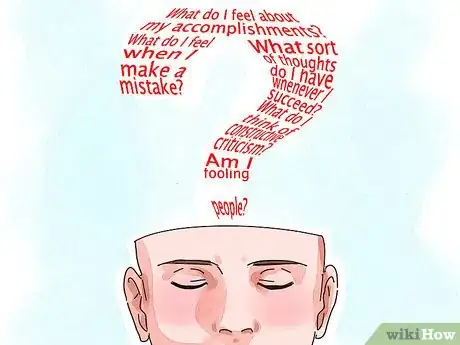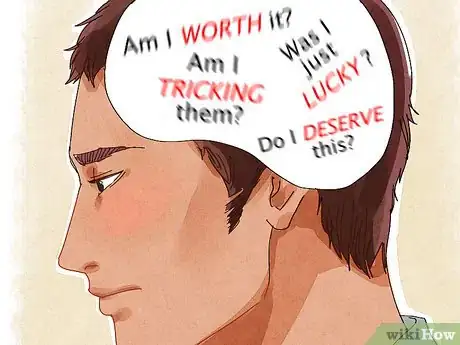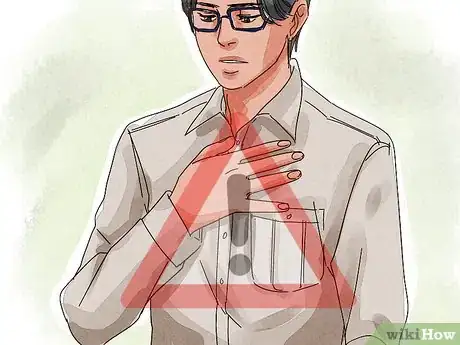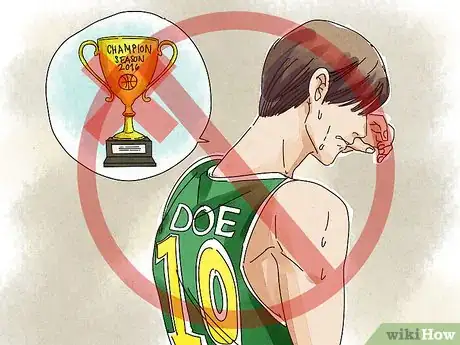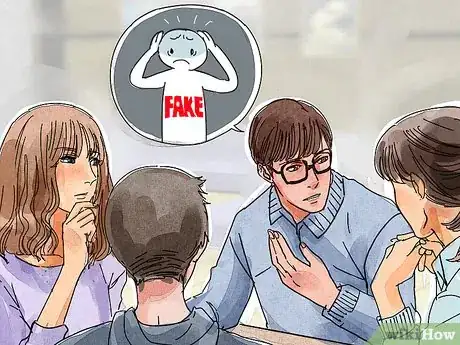This article was co-authored by Adina Zinn, MPA. Adina Zinn is a Certified Career & Life Coach and the Owner of Love Your Work Career and Life Coaching. With five years of experience, she specializes in using a holistic coaching approach to help people achieve their career and life goals. Adina earned a BA from The University of California, Santa Cruz and an MPA from San Francisco State University. She is also a Certified Career Coach through Career Coaches Institute and a Certified Life Coach through The International Coaching Federation.
There are 7 references cited in this article, which can be found at the bottom of the page.
This article has been viewed 12,003 times.
If you’re experiencing recurring feelings of inadequacy despite considerable personal success, you may be suffering from something called imposter phenomenon. This phenomenon is common and contributes to chronic self doubt. Those who experience imposter phenomenon are often concerned with being “found out” as inauthentic or fraudulent, even if they are very good at what they do. If you are experiencing these sorts of feelings, take the steps to identify specific symptoms, mitigate the effects, and consider getting help to overcome imposter phenomenon.[1]
Steps
Identifying Imposter Phenomenon
-
1Quiz yourself about potential symptoms. Ask yourself a series of questions identified by researchers to help assess whether you may be experiencing imposter phenomenon. Read and record your responses to each of the following questions. Don’t think too much about your response, simply write down the initial thought that comes to mind.[2]
- How do you feel about the accomplishments in your life?
- How do you feel when you make a mistake?
- What sort of thoughts do you have upon succeeding at something?
- How does constructive criticism make you feel?
- Do you ever feel as though you’re fooling other people?
-
2Recognize thoughts and sentiments that indicate imposter phenomenon. Look at your responses. If you tended to downplay your own accomplishments, doubt your abilities, worry about making mistakes, or struggle to receive criticism constructively, you may be experiencing imposter phenomenon. For example, if you ever feel as though you “got lucky” or that your accomplishments are “not a big deal,” this indicates that you may be ignoring your own success.[3]
- Further, if mistakes make you feel as though you “didn’t prepare enough” or “didn’t do a perfect job,” you may be demonstrating some perfectionist tendencies. These sentiments often coincide with imposter phenomenon.
- If criticism of your work or ideas makes you feel like you’re performing poorly, and makes your distraught, this can also indicate imposter phenomenon.
- If you ever feel as though you are “fooling” those around you, and worry about being “discovered” or “found out” as a “fake” or “imposter”, you are likely experiencing imposter phenomenon.
- Note that, though it is not considered to be a medical condition, these collected symptoms are often referred to as imposter syndrome.
-
3Ask yourself more direct questions. If you’re still unsure about whether your thoughts and sentiments amount to imposter phenomenon, there are more direct questions you can ask yourself. For instance, respond to the following questions honestly with yes or no answers.[4]
- Do you ever feel like you don’t deserve the accomplishments you’ve achieved?
- Do you worry that people will find out that you aren’t worthy of your position?
- Do you dismiss success immediately as a matter of luck or timing?
- Do you ever feel like you are tricking people?
- Do you think others think too highly of your personal accomplishments?
- How many times did you say yes to these questions? If your answer is two or more, you have likely experienced the effects of imposter phenomenon.
Mitigating the Mental Effects
-
1Check self-criticism as it arises. Get in the habit of addressing critical thoughts as soon as they arise.[5] This can help keep symptoms of imposter phenomenon in check. For instance, whenever you find yourself dwelling on a failure, or thinking about how you could have done more, stop and remind yourself that no one is perfect.[6]
- It helps to separate what's actually going on from what the voices in your head are telling you.[7]
- This is another healthy reminder: persistent self-doubt will make it harder for you to focus on your next goal. Calling yourself out may be enough to keep you from dwelling too much on negativity, especially when you have a task as hand.
- If a negative thought persists, simply tell yourself, “this is imposter phenomenon talking” - you’ll be surprised how much it may help.
-
2Re-frame how you think of your achievements. You may be allowing concepts like luck or chance to explain achievements that were the product of your skills and hard work. Fortunately, you can re-write the mental programming that allows thoughts like these to undervalue your worth.[8] Start by asking yourself: Did I play a role in my achievements? Hint: Of course you did!
- When you accomplish something, congratulate yourself. Sure, anyone can look back at everything they’ve done and imagine how they would do it differently - but it’s simply unhealthy and unproductive to do so. Instead, quietly remind yourself you’ve earned the right to feel good about what you achieved.
- Similarly, thank people for any compliments they offer. While you may be tempted to wave off a compliment with a comment like “Oh, I just got lucky”, stop yourself from doing so and say something like “Thanks, I really appreciate that”.
-
3Don't let minor slip-ups bring you down. For instance, maybe you’re an absolute coding whiz, but you fumbled a comment in your company meeting, and have found yourself feeling like you don’t measure up to your peers. Well, remind yourself who’s doing all of the coding. You may be more capable, and more valuable, than all the board-room smooth-talkers combined.[9]
- Re-frame failures too. When you do swing and miss, don’t let self-doubt beat you up about it. Instead, say to yourself, “This is a learning opportunity, and now I’m better prepared to address a similar scenario next time.”
-
4Remind yourself of what you do well. It’s likely worth sitting down and making a realistic assessment of your abilities.[10] Often, people who suffer from imposter phenomenon are intelligent, and have achieved a high amount of success. In turn, some high achievers find themselves setting their personal expectations for themselves at unrealistic levels - even a genius isn’t good at everything.[11]
- It may even help to write out the things you've accomplished, as well as the skills you know you can use to accomplish even more.[12]
- Whenever self-doubt does arise, visualize yourself completing a task or nailing a presentation. Not only does this recall past accomplishments, it can help prepare you for the next one. If nothing else, picturing success may help keep you calm and reduce symptoms of imposter phenomenon[13]
Getting Help From Peers and Professionals
-
1Join a support group. One of the best ways to share how you feel and learn how to address certain ways of thinking is talking to those going through the same thing. Look online, or contact a local therapist's office to ask for information on support groups near you.[14]
- Attend meetings with two goals in mind. On one hand, it will be helpful to express the thoughts and feelings about inadequacy and uncertainty. On the other hand, make sure to listen to advice others offer. They will likely have tried things that helped them overcome similar problems.
- Sometimes simply admitting that you feel like a fraud from time to time, and recognizing that others do as well, can help diminish the negative effects of these feelings and help you push them away.
-
2Find a mentor. Especially in high achieving environments, it’s worth developing a personal relationship with someone in a senior position. This can be especially helpful if they have had similar life experiences, such as climbing the rungs of academia or working as a female in a male dominated industry. Think of a mentor as someone who can provide knowledgeable support.[15]
- One of the roles a mentor can help with is better recognizing your value, as well as your individual accomplishments. They will also likely wind up pointing out that everyone has doubts from time to time, and that struggle is a part of reaching your full potential.
- Start meeting with a senior colleague or even a boss you get along with well as regularly as is convenient for both of you. If possible, drop into their office once a week.
-
3Consider helping others. One great way to better recognize your own expertise is by helping others learn about things you’ve mastered. An example is volunteering to teach those a bit less experienced than you about your profession. For instance, if you’re a photographer, consider volunteering to hold photography lessons once a month at a local high school for anyone who would like to attend.[16]
- Not only does it simply feel good to help others, you can develop your own skills, and better recognize your own expertise, by sharing them.
-
4See a mental health professional. Whenever a mental burden or discomfort begins to negatively affect your life, it’s worth seeing a psychologist or other therapist.[17] Imposter phenomenon in particular often goes unaddressed, and this can keep people from living happier, healthier lives. If your mind is frequently occupied by anxiety and worry of any sort, schedule a meeting to talk about it with someone soon.[18]
- Since imposter phenomenon is not treated as a mental disorder, you will likely be advised to take steps similar to those mentioned in this article. Your therapist or psychologist will address subjects like your perfectionism.
- For instance, establishing a stronger or more open relationship with a mentor or trusted colleague, writing about any symptoms you experience, and continuing to meet with a mental health professional are all likely recommendations.
Expert Q&A
-
QuestionHow do you treat impostor syndrome?
 Klare Heston, LCSWKlare Heston is a Licensed Independent Clinical Social Worker based in Cleveland, Ohio. With experience in academic counseling and clinical supervision, Klare received her Master of Social Work from the Virginia Commonwealth University in 1983. She also holds a 2-Year Post-Graduate Certificate from the Gestalt Institute of Cleveland, as well as certification in Family Therapy, Supervision, Mediation, and Trauma Recovery and Treatment (EMDR).
Klare Heston, LCSWKlare Heston is a Licensed Independent Clinical Social Worker based in Cleveland, Ohio. With experience in academic counseling and clinical supervision, Klare received her Master of Social Work from the Virginia Commonwealth University in 1983. She also holds a 2-Year Post-Graduate Certificate from the Gestalt Institute of Cleveland, as well as certification in Family Therapy, Supervision, Mediation, and Trauma Recovery and Treatment (EMDR).
Licensed Social Worker This is often well treated in a group where the person can receive feedback from a variety of others. Regular journal entries can also help. Pick one buddy who can mentor you.
This is often well treated in a group where the person can receive feedback from a variety of others. Regular journal entries can also help. Pick one buddy who can mentor you. -
QuestionHow do you beat imposter syndrome?
 Klare Heston, LCSWKlare Heston is a Licensed Independent Clinical Social Worker based in Cleveland, Ohio. With experience in academic counseling and clinical supervision, Klare received her Master of Social Work from the Virginia Commonwealth University in 1983. She also holds a 2-Year Post-Graduate Certificate from the Gestalt Institute of Cleveland, as well as certification in Family Therapy, Supervision, Mediation, and Trauma Recovery and Treatment (EMDR).
Klare Heston, LCSWKlare Heston is a Licensed Independent Clinical Social Worker based in Cleveland, Ohio. With experience in academic counseling and clinical supervision, Klare received her Master of Social Work from the Virginia Commonwealth University in 1983. She also holds a 2-Year Post-Graduate Certificate from the Gestalt Institute of Cleveland, as well as certification in Family Therapy, Supervision, Mediation, and Trauma Recovery and Treatment (EMDR).
Licensed Social Worker You can work on gradually increasing your self-confidence and work your way out of it. Develop ways of feeling better about yourself; use positive self-talk and try some meditation.
You can work on gradually increasing your self-confidence and work your way out of it. Develop ways of feeling better about yourself; use positive self-talk and try some meditation. -
QuestionHow can imposter syndrome be prevented?
 Klare Heston, LCSWKlare Heston is a Licensed Independent Clinical Social Worker based in Cleveland, Ohio. With experience in academic counseling and clinical supervision, Klare received her Master of Social Work from the Virginia Commonwealth University in 1983. She also holds a 2-Year Post-Graduate Certificate from the Gestalt Institute of Cleveland, as well as certification in Family Therapy, Supervision, Mediation, and Trauma Recovery and Treatment (EMDR).
Klare Heston, LCSWKlare Heston is a Licensed Independent Clinical Social Worker based in Cleveland, Ohio. With experience in academic counseling and clinical supervision, Klare received her Master of Social Work from the Virginia Commonwealth University in 1983. She also holds a 2-Year Post-Graduate Certificate from the Gestalt Institute of Cleveland, as well as certification in Family Therapy, Supervision, Mediation, and Trauma Recovery and Treatment (EMDR).
Licensed Social Worker A lot of times, it can go back to negative statements while growing up (from parents, siblings, teachers, etc). It can also arise from over-praise where the person does not feel he or she deserves it.
A lot of times, it can go back to negative statements while growing up (from parents, siblings, teachers, etc). It can also arise from over-praise where the person does not feel he or she deserves it.
References
- ↑ https://hbr.org/2008/05/overcoming-imposter-syndrome
- ↑ https://hbr.org/2008/05/overcoming-imposter-syndrome
- ↑ https://hbr.org/2008/05/overcoming-imposter-syndrome
- ↑ https://hbr.org/2008/05/overcoming-imposter-syndrome
- ↑ Adina Zinn, MPA. Certified Career & Life Coach. Expert Interview. 30 March 2022.
- ↑ http://www.apa.org/gradpsych/2013/11/fraud.aspx
- ↑ Adina Zinn, MPA. Certified Career & Life Coach. Expert Interview. 30 March 2022.
- ↑ https://health.clevelandclinic.org/a-psychologist-explains-how-to-deal-with-imposter-syndrome/
- ↑ http://www.apa.org/gradpsych/2013/11/fraud.aspx
- ↑ Adina Zinn, MPA. Certified Career & Life Coach. Expert Interview. 30 March 2022.
- ↑ http://www.apa.org/gradpsych/2013/11/fraud.aspx
- ↑ Adina Zinn, MPA. Certified Career & Life Coach. Expert Interview. 30 March 2022.
- ↑ https://hbr.org/2008/05/overcoming-imposter-syndrome
- ↑ https://www.psychologytoday.com/us/blog/real-women/201809/the-reality-imposter-syndrome
- ↑ http://www.apa.org/gradpsych/2013/11/fraud.aspx
- ↑ http://www.apa.org/gradpsych/2013/11/fraud.aspx
- ↑ https://www.helpguide.org/articles/mental-health/finding-a-therapist-who-can-help-you-heal.htm
- ↑ https://www.nami.org/help
